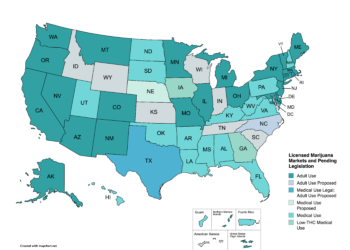New York’s licensing flood gates are finally opening after a week where two lawsuits against the state were settled. One lifted a restraining order that held 445 Conditional Adult Use Retail Dispensary (CAURD) license holders in limbo, and the other granted approval for the first Multi-State Operators to convert from medical to adult-use hybrid dispensaries by the end of the month.
All this comes less than two weeks before the end of New York’s general operator application window, which is expected to bring in another thousand adult-use licenses.
The state originally planned to reserve the first round of retailer licenses for charitable organizations and individuals with prior cannabis convictions from New York state. Only 27 out of 472 were able to open before lawsuits from applicants that did not qualify for CAURD licenses resulted in the court-ordered freeze.
New York’s Cannabis Control Board voted to allow six of the state’s 10 medical cannabis providers into the adult-use market, during the board’s Dec. 8 meeting.
Those six companies, licensed as Registered Organizations (ROs) in New York, include Columbia Care, Cresco, Etain, Curaleaf, Acreage and PharmaCann. All six will be permitted to convert one of their three existing medical cannabis dispensaries into a hybrid retailer before the end of the month.
MSOs happy to expand sales
The ROs were originally going to have to wait until the end of 2024 to enter the market, but this was before four of the ROs formed the Coalition for Access to Regulated & Safe Cannabis and, along with some prospective dispensary owners, sued in March. The previous month, four veterans sued the state after they had also been left out of the CAURD application round. Both cases are finally settled, meaning they and the CAURD applicants can move forward.
“To finally get on the same page as OCM in charting a sustainable path forward for a vibrant cannabis market is an incredible step forward for New York customers and patients, and the countless entrepreneurs from businesses of all sizes who have been eager to enter this emerging market,” said Curaleaf CEO Matt Darin in a statement. “As New York works to turn the tide in shutting down this illicit market, the most effective tool to do so is with a robust legal market where New Yorkers can securely purchase safe, tested, and well-regulated cannabis products, and that is what this ratified agreement ensures.”
Matt Kotzke, chief operating officer and interim chief executive officer of RIV, which owns Etain, also weighed in with a statement.
“The excitement surrounding this expansion of the New York adult-use cannabis market is palpable,” he said. “We are ready to begin this new chapter and it is a true testament to our team, their expertise, their passion, and the hard work we have done to prepare for this moment.”
“New York is going to rapidly become the largest cannabis market in the country, and we are ready to supply that growing demand from our scaled cultivation and manufacturing facilities in Long Island and Rochester, with premium and enjoyable products,” added Nicholas Vita, CEO of The Cannabist Company, which was formerly known as Columbia Care.
The settlements clarified that they did not include an admission of wrongdoing, which is a common feature in settlements such as this one.
“It is understood and agreed that any actions taken pursuant to this stipulation are made solely to avoid the burdens and expense of protracted litigation,” said both filings.
The settlements allow the existing pre-approved CAURD holders to move toward final licensure, but it also includes a restriction against the issuance of any new CAURD licenses until after April 1, 2024. There are currently 483 CAURD applicants that will have to wait until next spring, according to CRB Monitor’s license database.
The settlement states that this delay allows the state to “dedicate OCM’s application and licensing resources in the next coming months to the current application and licensing window for adult use licenses, including SEE (Social & Economic Equity) applicant licenses.”
The state also agreed to create a task force to promote greater access into the cannabis industry for service-disabled, veteran-owned businesses and prioritize research on how cannabis can treat veterans’ health needs.
In the meantime, the application period for all other individuals opened in October and will last until Dec. 18, from which the New York Office of Cannabis Management (OCM) has said it expects to license at least 1,000 operators, from cultivators to processors to retailers.













